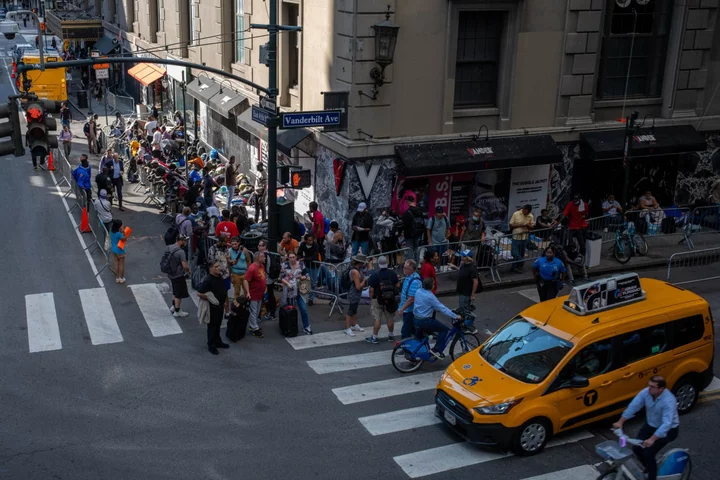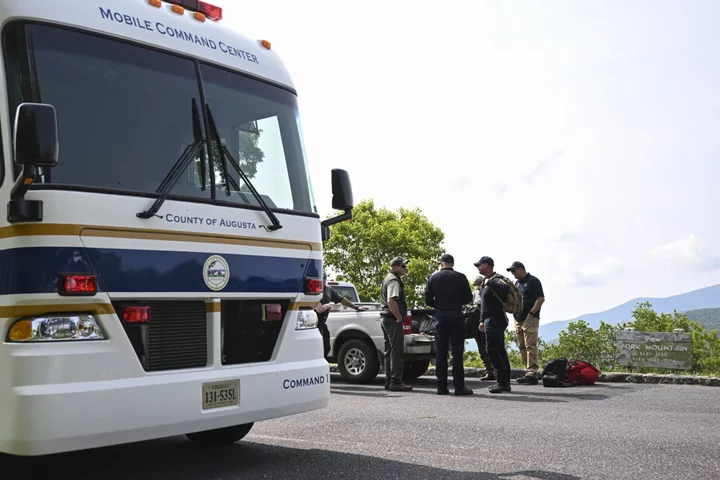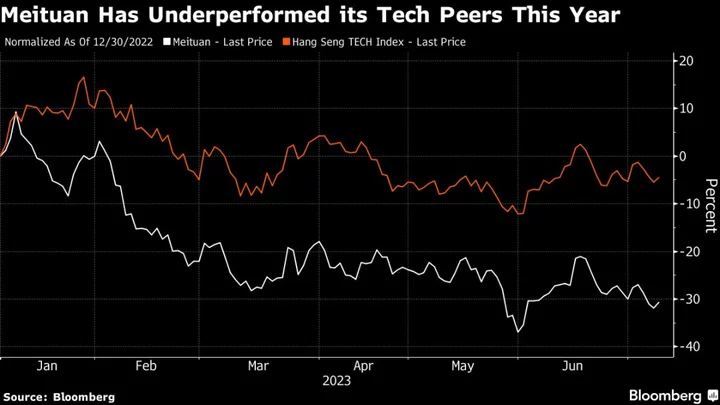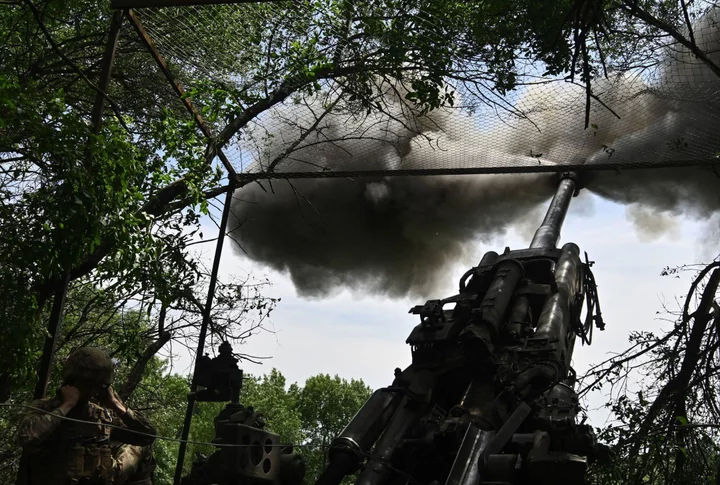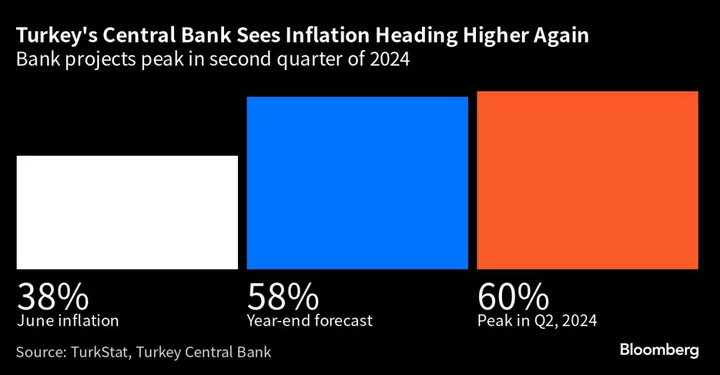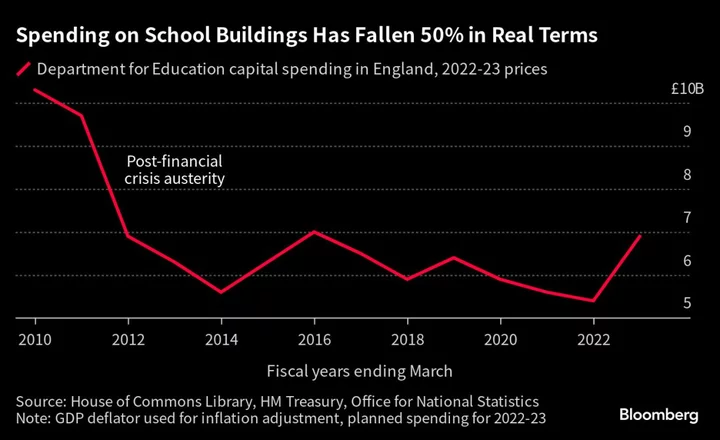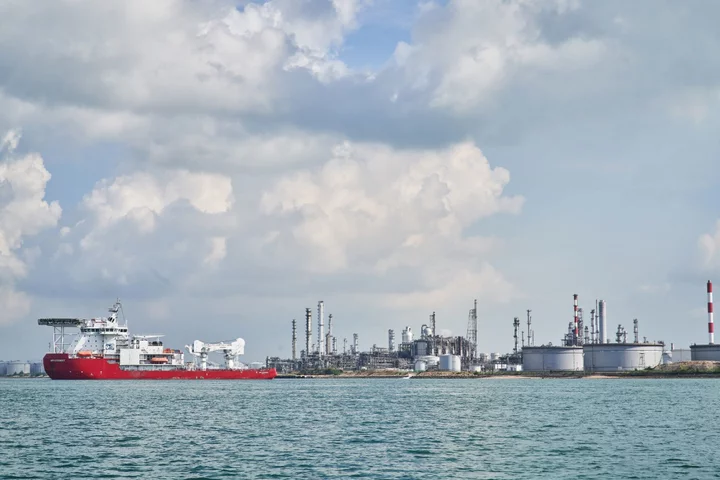In August 2022, after greeting one of the first buses of immigrants arriving in New York City with handshakes and boxes of food, Mayor Eric Adams pledged officials would set “the right tone of being here for these families.”
A year later, that tone has shifted dramatically. Adams is warning of dire consequences for the city after 110,000 arrivals. He’s begging the federal government for money, telling migrants at the border not to come and demanding state officials find other places to house those who arrive anyway.
“Let me tell you something New Yorkers: Never in my life have I had a problem that I did not see an ending to. I don’t see an ending to this,” Adams said at a town hall meeting this week, lamenting the 10,000 people pouring into the Big Apple every month. “This issue will destroy New York City.”
Frustration is boiling over in Democratic strongholds from Boston to Chicago to Denver and Los Angeles as thousands of migrants, many of them seeking asylum, overwhelm shelters, social services and already-stretched budgets. Not only is the situation creating tensions within cities on how to respond, it’s becoming a divisive issue going into the 2024 election. Polls show that one of President Joe Biden’s biggest political vulnerabilities among his base is the administration’s handling of immigration.
“The immigration issue in general is dicey for Democrats,” said Jim Kessler, the executive vice president for policy at the center-left think tank Third Way. “President Biden is using tape and paste and duct tape to deal with an issue that really needs to be dealt with by Congress.”
New York City is shouldering a great deal of the cost, largely due to a decades-old law known as right-to-shelter that means no one who needs housing can be turned away. Adams, who went to court in May to try to end that obligation, said that the city could spend as much as $12 billion supporting migrants in the next two years.
For months now, he’s been fighting with Governor Kathy Hochul and the federal government over whose responsibility it is to care for migrants. It’s soured the mayor’s once close relationship with Biden, and members of the city council have accused him of using xenophobic rhetoric that plays into Republican talking points.
For its part, the Biden Administration has requested $600 million more from Congress to provide shelter and other services nationally and says it will work with cities to help eligible asylum seekers apply for work permits. New York City says almost all its recent arrivals have sought asylum or indicated they will.
White House spokeswoman Karine Jean-Pierre said Thursday that federal officials have provided the state and city with $140 million this fiscal year. She added that officials talked with Hochul that day to discuss ways the federal government can support New York.
“The president has done all that he can from his perch,” Jean-Pierre said. “We need Congress to act.”
While encounters with immigrants at the border slowed earlier this summer, more recently the numbers have ticked higher again. Republicans are criticizing Biden for not taking aggressive action to stem crossings and pointing to urban turmoil as evidence of the chaos caused by too many people entering the country.
In Los Angeles, the influx is worsening one of the nation’s most dire homeless crises. Denver is reaching out to migrants at the border, telling them not to come and offering tickets to Chicago instead. Massachusetts declared a state of emergency last month, and advocates are pushing Biden to do the same at the national level.
In the Windy City, shelters are so full that police stations are housing hundreds of recent arrivals, who often set up sidewalk camps in residential neighborhoods during the day. Officials are warning of millions of dollars in budget-busting expenses and asking for help. And fissures are growing along racial lines, with Black residents questioning why so much is being spent on immigrants following years of neglect in their communities.
It comes less than a year before Chicago hosts the Democratic National Convention, where Biden is expected to be nominated for a second term. While organizers say they’re confident the convention will put a spotlight on workers rights, reproductive freedom and economic justice, worries are growing about how Chicago will be portrayed when 50,000 attendees and hordes of media descend on the city. O’Hare International Airport recently erected curtains to hide migrants sleeping there from public view.
Amid memories of violent protests when Chicago hosted the convention in 1968, the anxiety is such that local politicians have begun speculating, without offering evidence, that Republican governors will send extra buses of migrants before the convention to sow chaos.
“Republicans already have signaled that they want to make this an issue in the campaign,” said David Axelrod, a senior adviser to former President Barack Obama. “They are going to try and exploit that, and so to do it at the Democratic Convention seems completely consistent with what we’ve seen.”
Sending migrants from border states is a political move that can put them in harm’s way and put pressure on cities that welcome them, said Cristina Pacione-Zayas, first deputy chief of staff in Chicago Mayor Brandon Johnson’s administration. The city’s costs totaled at least $93.4 million from Jan. 1 through June 30, she said.
The federal government in fiscal 2023 gave more than $48 million to Chicago and Illinois for humanitarian relief, shelter and services.
One of the biggest challenges for cities, and for many migrants, is how they can support themselves. Those who have applied for asylum can’t seek work permits until about six months after the request.
Neyer, who asked to be identified only by his first name, arrived in Chicago from Venezuela with a friend last month. He is hoping to obtain a work permit so he can get jobs in construction to pay for his own housing and eventually unite his family.
“I’m broke and I need to find something long term,” Neyer, 24, said in an interview at a police station where he was staying in the Albany Park neighborhood.
US Representative Delia Ramirez, a first-term Democrat from Chicago, says quickly granting work permits to eligible asylum seekers is critical for ending the crisis. She lamented what she described as migrants and long-suffering Black communities fighting over who gets what crumbs, calling it “painful” to witness.
In one majority Black neighborhood on the South Side, tensions have flared over a plan to convert a hotel into a migrant shelter. Residents at a community meeting last month objected to the city spending so much on new arrivals.
“Take them someplace else or send them back to Venezuela,” one woman said. Most “of the people homeless in this city are Black people. What have you done for them?”
About 1,000 miles (1,600 kilometers) west in Denver, the cost to shelter and support the 16,700 immigrants who have arrived so far has topped $23 million. Mayor Mike Johnston, a Democrat who took office in July, said the city has been helping pay for bus tickets for those hoping to get to other places.
“It’s much more efficient for us to contact them in El Paso and say, ‘Before you get on a bus to Denver, if your goal is really to go to Chicago, let’s get you on a bus to Chicago,’” Johnston said in August. “That’s better for them and much more efficient and affordable for us.”
Cities have complained for more than a year about receiving buses of immigrants dispatched by Republicans including Texas Governor Greg Abbott.
“Until President Biden steps up and does his job, Texas will continue busing migrants to sanctuary cities to provide relief to our overwhelmed border towns,” a spokesman for the governor’s office wrote in an email.
What’s new is that tensions are rising between Democratic cities that are the destinations for migrants.
Anne Williams-Isom, New York’s deputy mayor for health and human services, said the rest of the US seems to be taking advantage of the city’s generous housing policies for migrants by encouraging more people to go there.
“We have a big heart, we have compassion, we’re going to take care of people,” she told reporters Sept. 6. “While we love that and we are so proud of that, I think in a way it’s being used against us and I am frustrated by that.”
Attracting new arrivals is crucial to support the labor market and cities’ growth, according to Muzaffar Chishti, a senior fellow for the non-partisan Migration Policy Institute, which collects data on the subject. Last year, foreign-born workers drove the majority of the US workforce expansion.
But the surge in new arrivals has been difficult to absorb in such a short time, Chishti said. He points out that the political firestorm and fiscal strain in the Democrat-led cities comes when they still haven’t regained their footing from the Covid-19 pandemic. The situation is testing some cities’ commitments to being a sanctuary for migrants, Chishti said.
“They realize welcoming is nice, but it’s not free,” he said.
--With assistance from Tarso Veloso, Jordan Fabian, Vincent Del Giudice, Ellen M. Gilmer and Julie Fine.
Author: Shruti Date Singh, Augusta Saraiva and Laura Nahmias

